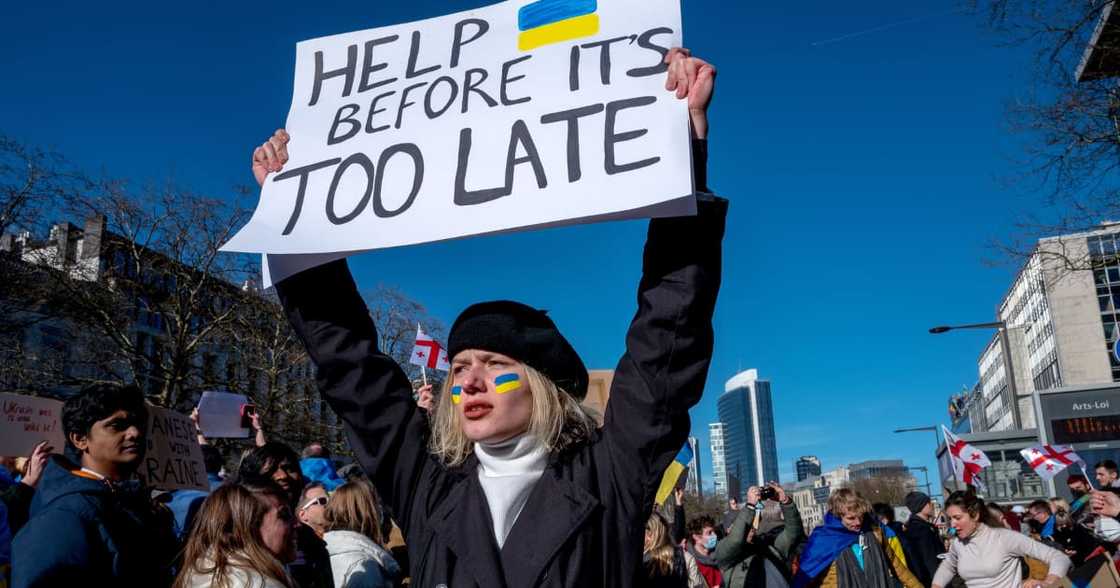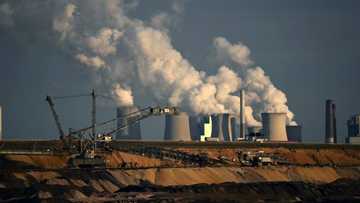Explained: Why the World Is on the Brink of a Humanitarian Crisis Due to Russia’s War in Ukraine
On 24 February 2022, Russia launched its attack on the eastern European country of Ukraine. Since then, the world has had to deal with huge increases in food prices while also staring at the possibility that aggravation of food shortages is already becoming a reality.
PAY ATTENTION: Follow Briefly News on Twitter and never miss the hottest topics! Find us at @brieflyza!
Ukraine has been under siege at the hands of the Russian military for over 100 days. The country has had to deal with the loss of countless lives and infrastructure. The destruction caused by Russia has dampened Ukraine's ability to efficiently carry on with the exportation of goods.

Source: Getty Images
The Russian military has attacked Ukraine's agriculture sector and made it more difficult for the country to export much-needed food products across the globe. This has caused an adverse effect across the world, especially in the Middle East and Africa, which rely on Ukraine for food imports.
These countries are now being met with the harsh reality that should Russia's invasion continue, a food security crisis and famine could arise.
How much food does Ukraine supply to the world?
During a webinar series hosted by the South African Institute of International Affairs (SAIIA), Professor Vitalii Dankevych, who is a Doctor of Economics and a food security expert, explained that Nothern African countries are strategic trading partners with Ukraine.
PAY ATTENTION: Click “See First” under the “Following” tab to see Briefly News on your News Feed!
The reason for this is that Ukraine is one of the top five countries that produce and export agricultural products across the globe. In terms of ranking, Ukraine is the number one exporter of sunflower oil.
This European country is also in the sixth position in exporting corn and barley, in the seventh position when exporting grape seed, and in the ninth position in terms of wheat and soybeans exports.
The World Food Program recently warned that when a country such as Ukraine, which grows food for approximately 400 million people, is out of supplies, it creates market upheaval and stress, which we are already seeing now.
Ukraine exports these goods to mainly Middle Eastern and African countries; however, the country also exports to other European countries and China. Egypt and Ukraine are huge trade partners, as the African country imports the highest volume of goods from Ukraine in Africa.
Other African countries which import food products from Ukraine include Tunisia, Libya and Morocco. However, it is also important to note that should a food security crisis occur, central African countries would also be impacted.
How has Russia's invasion affected Ukraine's agricultural sector?
Prof Danekevych explained in his presentation that Russian troops did not just attack Ukraine's military bases, but also heavily disrupted the agricultural sector. Russian troops have rendered 30% of Ukraine's agricultural territory unusable, resulting in disruptions during the vital planting season.
The country has also seen infrastructure losses after Russia used landmines to destroy much of the agricultural machinery, with more reportedly stolen by Russian troops. In addition to that, Dankevych highlighted that Russia is also responsible for the destruction of livestock and poultry farms.
The Russian military attacked Ukraine's only National Center for Plant and Genetic Resources in Kharkiv (Eastern Ukraine), which housed more than 160 000 plant species from around the world. Russia's attacks on Ukraine's agricultural sector have a devastating impact on the country's economy because the sector forms 16% of Ukraine's GDP.
Why can't Ukraine export to Africa, and how will this affect prices?
Russia is not only attacking Ukraine on land, but also launching attacks at the sea too. Ukraine has found it more difficult to export food because Russian ships are blockading the Black Sea and Azov.
Seaports in Maripoul are also unable to export due to being occupied by Russian troops. This is despite Ukraine still having enough food to meet global demands at the moment.
These sea routes are vitally important because they are mainly used to export food products to countries across the globe. Without access to the Black and Avoz seas, Ukraine has to use neighbouring countries' ports and onshore routes to export food, which means the country has to spend more to export food products.
As a result of high costs for exporting, food products have gotten even more expensive and in South Africa, a two-litre bottle of sunflower oil has gone over the R100 mark in many supermarkets.
Alternate Executive Director of the International Monetary Fund (IMF) representing 16 European countries, including Ukraine, and a member of the IMF Executive Board, Vladyslav Rashkovan, noted during his presentation that according to the African Development Bank, food prices have increased by 45% in Africa. He added that the poor populations in Africa will be more impacted by the war than the rich.
Rashkovan also stated that Russia's war on Ukraine has also resulted in the inflation rate increasing drastically, stating that inflation is a tax on poor people as they are mostly impacted.
Dankevych explained that in order to avoid a humanitarian crisis and bring down the cost of food, Ukraine will need to regain access to its seaports once again, and that means the war would need to end.
How is Russia threatening global security?
Not only is the world on the brink of a global crisis, Rashkovan stated that Russia is threatening global peace by constantly threatening to use nuclear weapons. The use of nuclear weapons could have catastrophic effects that will last for a very long time.
Rashkovan says these kinds of threats from Russia are akin to nuclear terrorism.
Russia has been using weapons that have been banned by international conventions, such as phosphorus bombs and anti-personnel mines, demonstrating the lengths Russia is willing to go to to destroy Ukraine, which has a population of 40 million people.
Explained: Why South Africa’s food bill has gone up at least 12% this year
Briefly News previously reported that South Africans have been finding it increasingly difficult to make ends meet in this current economic climate. Many have started to notice that the cost of living is not what it used to be and basic food prices are going up on a month-to-month basis.
On Tuesday, 31 May, the Department of Energy and Minerals announced that the fuel price will hike up to a record high price of R24.17/litre for 95-octane fuel and R23.94/litre for 93. With rising fuel prices, there is a concern that food and other necessary expenses will also cost more.
In March 2022, the Food and Agriculture Organisation (FAO) announced that global food prices went up by 12.5%, the highest hike in years.
PAY ATTENTION: check out news exactly for YOU ➡️ find "Recommended for you" block and enjoy!
Source: Briefly News






